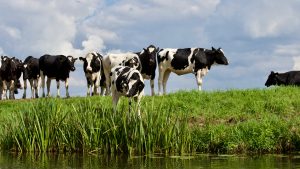How Long Can A Cow Lay Down Before It Dies 
When it comes to the well-being of livestock, particularly cows, understanding their behavior and needs is crucial.
One intriguing question that often arises is, “How long can a cow lay down before it dies?”
In this article, we’ll delve into this topic, shedding light on the factors that affect a cow’s ability to lie down, the importance of rest, potential risks, and how farmers and caretakers can ensure the optimal health and comfort of their bovine companions.
How Long Can A Cow Lay Down Before It Dies
The Natural Behavior of Cows
Cows, like many animals, have natural behavioral patterns that play a vital role in their overall health. One of these behaviors is lying down. Cows tend to lie down for various reasons, including resting, ruminating, and escaping adverse weather conditions. They have a natural instinct to find a comfortable and safe spot to rest, contributing to their overall well-being.
The Significance of Rest for Cows
Rest is essential for cows’ physical and mental health. When a cow lies down, it can better distribute its weight and relieve pressure on its hooves, which is crucial for preventing hoof-related issues. Additionally, lying down allows cows to better digest their food through the process of rumination, where they regurgitate and rechew their cud. Proper rumination supports efficient digestion and nutrient absorption.
Factors Affecting Lying Down Behavior
Several factors influence how long a cow can comfortably lie down:
1. Comfortable Environment
Cows prefer clean and dry resting areas. Providing comfortable bedding, such as straw or sand, encourages cows to lie down for extended periods.
2. Health and Well-being
A cow in good health is more likely to lie down for extended periods. Any underlying health issues or discomfort can hinder their ability to rest.
3. Social Dynamics
Cows are social animals and may be reluctant to lie down if they feel threatened or if the herd’s dynamics are disrupted.
4. External Stressors
Loud noises, extreme temperatures, or disturbances from predators can discourage cows from lying down.
Potential Risks of Prolonged Standing
While cows are resilient creatures, prolonged periods of standing can lead to various health concerns:
1. Lameness
Continuous standing can strain a cow’s hooves and lead to lameness, a painful condition that affects mobility.
2. Reduced Milk Production
Stress caused by inadequate rest can impact a cow’s milk production, potentially affecting dairy farmers’ yields.
3. Muscle Fatigue
Just like humans, cows can experience muscle fatigue from prolonged standing, leading to discomfort and decreased well-being.
Ensuring Cow Comfort and Health
To promote the well-being of cows and ensure they can lie down comfortably:
1. Provide Adequate Resting Areas
Farmers should create clean and comfortable resting areas with proper bedding materials to encourage cows to lie down.
2. Regular Health Checks
Routine health checks can identify and address any health issues that might affect a cow’s ability to rest.
3. Minimize Stressors
Efforts to minimize loud noises, extreme temperatures, and disruptions can contribute to a more relaxed environment.
How Long Can A Cow Lay Down Before It Dies FAQs
- Can cows sleep while standing? Yes, cows can sleep while standing, but they typically prefer lying down for more extended periods.
- How many hours a day do cows lie down? On average, cows lie down for about 10 to 12 hours a day, depending on factors such as age, health, and environment.
- What are some signs of discomfort in cows? Signs of discomfort in cows may include restlessness, frequent shifting of weight, and decreased feed intake.
- Do cows dream during sleep? While the exact nature of cows’ dreams is unknown, research suggests they do experience various sleep stages, including REM sleep.
- Can over-milking affect cows’ lying down behavior? Yes, over-milking can lead to stress and fatigue in cows, potentially impacting their lying down behavior.
Conclusion
In conclusion, understanding how long a cow can lie down before it faces potential health risks is essential for responsible livestock management. Creating a conducive environment for cows to rest, prioritizing their well-being, and addressing any underlying issues are key steps in ensuring their overall health and longevity.
Recent Posts
Finding reliable suppliers is essential for aviation operators searching where to buy Jet Fuel A1 in Romania because fuel quality directly affects aircraft safety and engine performance. Romania has...
Romania’s strategic location in Eastern Europe, access to the Black Sea, and developed refinery infrastructure have made it a key jet fuel export hub in the region. In 2025, Romania exported over...